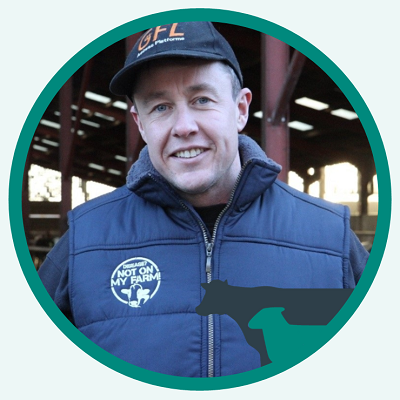You are here
- Hub home
- Farmer home
- On My Farm!
- Top ways to improve biosecurity on dairy farms
Top ways to improve biosecurity on dairy farms
On My Farm! Blog
Top ways to improve biosecurity on dairy farms
Whether disease is already present or not, biosecurity should be a priority for every farmer. Here, dairy farmers share how they have maximised herd health by implementing thorough biosecurity protocols.
“We buy replacements for our dairy herd from Osnabrück in Germany, as the region is free of bTB, BVD and IBR. Before you purchase livestock, I’d advise always scrutinising the source farm - ask about their vaccination policy, their disease status, and discuss pre-sale testing with your vet.
Once on the premises, we isolate bought-in heifers in a shed 800 metres away from the rest of the herd. We use this time to monitor health and get the heifers used to our grazing system through access to a paddock.
They also start on the Bovilis® Leptavoid®-H vaccination programme, which helps to protect against leptospirosis, so they’re synchronised with the rest of the herd who receive their annual boosters before turnout.”
“We sell raw milk direct to the public and are really careful to keep customers completely separate from our herd. This helps to minimise any chance of bacteria spreading from person to animal, or vice versa. We located the vending machines on the yard in front of our house, right next to the car park, so customers aren’t walking around the farm.
If we have a group of visitors here for a farm tour, such as a local Young Farmers’ Club (YFC), everyone has to disinfect their footwear before and after we show them around.
Robust biosecurity is so important to keep our cows healthy, and prevent anyone taking anything back to their own farm.”
“For us, biosecurity starts at birth, when calves are fed four litres of pasteurised, quality measured colostrum. All cows have been injected with Bovilis® Rotavec® Corona at the appropriate time during their pregnancy and this helps protect their calves from scours caused by rotavirus, coronavirus and E. coli F5 (K99) and F41, as long as they receive sufficient colostrum from their vaccinated dams.
We don’t want calves to come into contact with any manure, so we aim to snatch calve and place them immediately under a heat lamp in a disinfected hutch, which is bedded over lime with bark and then straw.
From one week of age, we use Bovilis® INtranasal RSPTM Live on calves, which we find makes them more able to fight off respiratory disease caused by BRSV and PI3.”
“Vaccination is a key element to our biosecurity, to help prevent disease spreading in our herd. A few years ago, a bulk milk tank test showed IBR was present in our herd, and the vet suggested we implement a vaccination programme using Bovilis® IBR Marker Live.
This has helped us to prevent IBR outbreaks and protect cow health.
Vaccination takes time and needs to be factored into the daily workload alongside other farm jobs, however it’s definitely been worth the investment.”
Bovilis® Leptavoid®-H vaccine contains Leptospira interrogans serovar hardjo (prajitno). For the active immunisation of cattle from one month of age against Leptospira interrogans serovar hardjo and L. borgpetersenii serovar hardjo. POM-VPS.
Bovilis® Rotavec® Corona Emulsion for Injection for Cattle contains inactivated bovine rotavirus, inactivated bovine coronavirus and E. coli strain CN7985, serotype O101:K99:F41 vaccine antigens. POM-VPS.
Bovilis® INtranasal RSPTM Live, Nasal Spray, Lyophilisate and Solvent for Suspension for Cattle, contains live Bovine Respiratory Syncytial virus (BRSV) and live Bovine Parainfluenza virus (PI3) vaccine antigens. POM-V.
Bovilis® IBR Marker Live contains live bovine herpesvirus and is indicated for the active immunisation of cattle to reduce the intensity and duration of the clinical respiratory signs induced by an infection with BHV-1 and to reduce nasal excretion of field virus. POM-V.
Further information is available from the SPC, datasheet or package leaflets.
Advice should be sought from the medicine prescriber.
Prescription decisions are for the person issuing the prescription alone.
Use Medicines Responsibly.
MSD Animal Health UK Limited, Walton Manor, Walton, Milton Keynes, MK7 7AJ, UK
Registered in England & Wales no. 946942









